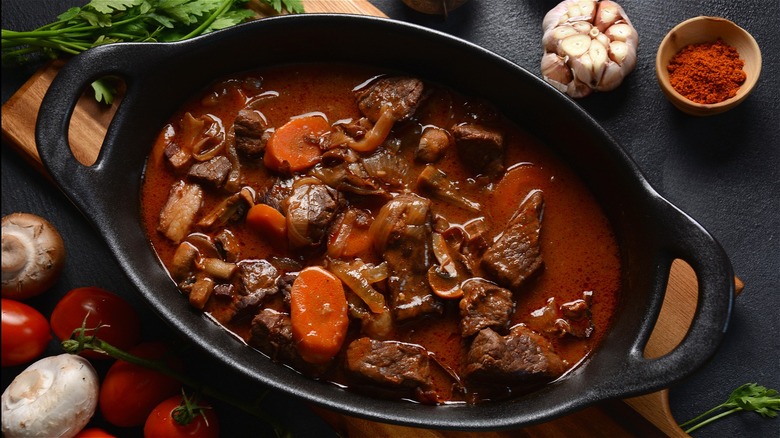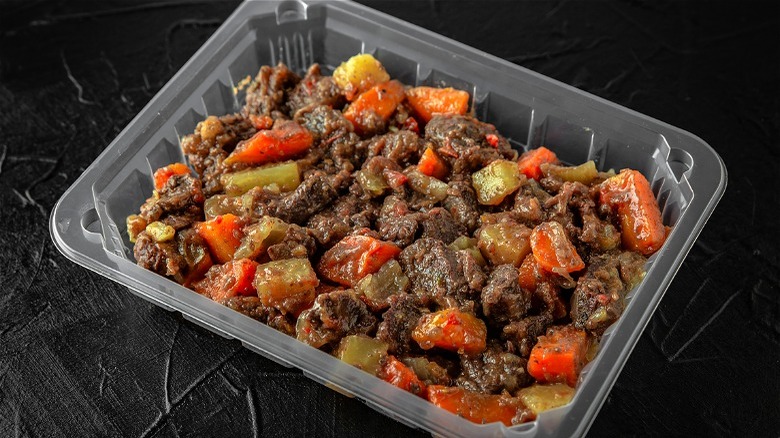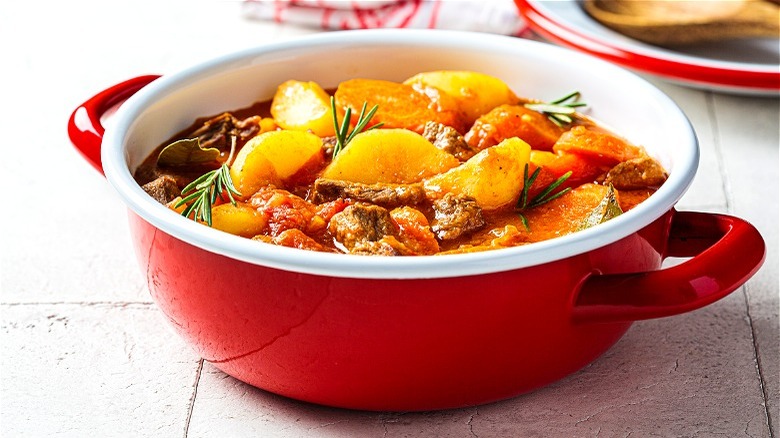The Science Behind Why Stew May Taste Better Over Time
Stew is one of those culinary gifts that keeps on giving long after the first slow simmered bite hits your lips. No one enjoys stressing over what to eat for dinner during the week: with a big pot of easy beef stew on your stove, you're more than likely guaranteed to have leftovers for days. One 2022 study conducted by Bosch appliances in conjunction with OnePoll found that the average American diet consists of three leftover meals per week (per SWNS Digital). Among the 72% of survey respondents who consider themselves leftover fans, out of all the foods to chow down on the next day, soup was the most popular garnering 79% of voter loyalty. What makes soup a top choice for leftover meals?
Country Living outlines how soup and stew contain a similar baseline of ingredients: an array of vegetables and protein are melded together in some form of liquid and cooked over heat yet they differ in how much liquid is used. Country Living claims stew often has a longer cook time since many recipes call for tougher cuts of meat cooked in smaller amounts of liquid. Even MasterClass claims classic beef stew can taste better the next day. Is there real science backing the notion that certain foods like stew taste better over time?
There are scientific reasons your stew may taste better days later
First off, Science of Cooking claims that when a soup or stew is created, sautéeing meat and vegetables in some form of fat over heat creates the Maillard reaction which is a fancy name for browning but does create a chemical reaction that produces an indefinite amount of new flavor compounds in your resulting dish. Yet, how do those long-cooked leftovers develop in cold storage specifically?
According to BBC Science Focus, stew may taste better the next day due to the breakdown and transformation of meat collagen into gelatin. This resulting gelatin will give your stew a creamier consistency. Not only that, but any liquid that remains in slow-cooked dishes is likely to be soaked up by any starchy ingredients, creating more nuanced, developed flavors. Cook's Illustrated backs up this claim, outlining how the chemical reactions that occur during cooking continue to build once the food is removed from a heat source. Even though at smaller intervals, soups and stews may continue to develop in flavor when refrigerated due to the muddle of varying flavor compounds. So there is actual truth behind why your slow-cooker Thai beef stew tastes better on day two or three. However, when it comes to deciding which day your stew tastes best, it's genuinely a matter of personal preference.
Only you can decide when a homemade stew is at its peak
Beyond the simple hack that will upgrade your next stew, you can rest assured that real science is taking place as the leftovers of your favorite dish blend more and more in your refrigerator. According to the spokesperson for the Institute of Food Technologists, Dr. Kantha Shelke, dishes that have enhanced flavor after day one usually contain a significant amount of aromatics which are essentially herbs, spices, and vegetables cooked together to create a powerful flavor profile in your recipes (per Forbes). However, if distinctiveness is what you're after, you may enjoy your favorite homemade stew best on day one.
Chef J. Kenji López-Alt decided to taste test some of his very own recipes on different days and compare (via Serious Eats). While López-Alt found no significant difference in the beef stew, he believed his tomato soup and chili lost their marked flavor notes: he was not able to spot the individual spices in his leftover taste tests. Sure enough, Dr. Shelke confirms this suspicion stating that on day one of making a recipe, your taste buds may be able to detect individual flavors, and even though you can taste these flavors in leftover portions, they are "much less pronounced and the dish is therefore more mellow or rounded in flavor" (per Forbes). As to which day your food tastes best, it all depends on the amount of flavor development you want in your home-cooked meals.


